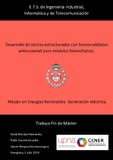Mostrar el registro sencillo del ítem
Desarrollo de vidrios estructurados con funcionalidades antisuciedad para módulos fotovoltaicos
| dc.creator | Navajas Hernández, David | es_ES |
| dc.date.accessioned | 2019-07-26T12:15:07Z | |
| dc.date.available | 2019-07-26T12:15:07Z | |
| dc.date.issued | 2019 | |
| dc.identifier.uri | https://hdl.handle.net/2454/33707 | |
| dc.description.abstract | La producción de electricidad mediante tecnología fotovoltaica puede verse afectada negativamente por la acumulación de suciedad en su cara frontal. En este sentido, el desarrollo de soluciones antisuciedad que disminuyan la adherencia del polvo y la arena a los vidrios fotovoltaicos tiene una gran importancia. El objetivo de este proyecto es el estudio de las propiedades antisuciedad de vidrios fotovoltaicos con microestructuras realizadas en su cara frontal. Con esta finalidad, en primer lugar, se estudiarán los principales mecanismos de adherencia de la suciedad a los vidrios fotovoltaicos, y se incorporarán en los modelos existentes el efecto de las microestructuras. A continuación, utilizando procesos de fotolitografía y ataque seco se fabricarán y caracterizarán varios vidrios estructurados con distintos tamaños de las estructuras. Finalmente, se probará experimentalmente, con dos tipos de suciedad artificial estandarizada, el efecto antisuciedad de estos vidrios estructurados. | es_ES |
| dc.description.abstract | Electricity production through photovoltaic technology may be negatively affected by the accumulation of soiling in the front surface. In this regard, the development of soiling solutions that decrease the dust and sand adherence to the photovoltaic glass is very relevant. The principal aim of this project is the study of antisoiling properties of photovoltaic glass with microstructures on the front surface. For this purpose, in the first place the principal adhesion mechanisms to photovoltaic glass are going to be studied, and the effect the structures have on them will be introduced. Following using photolithography processes and reactive ion etching, structured glasses with different sizes of pillars will be fabricated and characterized. Finally, the antisoiling effect of these structured glasses will be experimentally investigated with two types of standardized artificial soiling. | es_ES |
| dc.format.mimetype | application/pdf | en |
| dc.language.iso | spa | en |
| dc.subject | Vidrios estructurados | es_ES |
| dc.subject | Soiling | es_ES |
| dc.subject | Microestructuras | es_ES |
| dc.subject | Fotolitografía | es_ES |
| dc.subject | Fotovoltaica | es_ES |
| dc.subject | Structured glass | es_ES |
| dc.subject | Soiling | es_ES |
| dc.subject | Micro-structures | es_ES |
| dc.subject | Photolithography | es_ES |
| dc.subject | Photovoltaics | es_ES |
| dc.title | Desarrollo de vidrios estructurados con funcionalidades antisuciedad para módulos fotovoltaicos | es_ES |
| dc.type | Trabajo Fin de Máster/Master Amaierako Lana | es |
| dc.type | info:eu-repo/semantics/masterThesis | en |
| dc.date.updated | 2019-07-25T07:43:41Z | |
| dc.contributor.affiliation | Escuela Técnica Superior de Ingenieros Industriales y de Telecomunicación | es_ES |
| dc.contributor.affiliation | Telekomunikazio eta Industria Ingeniarien Goi Mailako Eskola Teknikoa | eu |
| dc.description.degree | Máster Universitario en Energías Renovables: Generación Eléctrica por la Universidad Pública de Navarra | es_ES |
| dc.description.degree | Energia Berriztagarrietako Unibertsitate Masterra: Sorkuntza Elektrikoa Nafarroako Unibertsitate Publikoan | eu |
| dc.rights.accessRights | Acceso embargado 5 años / 5 urteko bahitura | es |
| dc.rights.accessRights | info:eu-repo/semantics/embargoedAccess | en |
| dc.contributor.advisorTFE | Sanchis Gúrpide, Pablo | es_ES |
| dc.contributor.advisorTFE | Bengoechea Apezteguía, Jaione | es_ES |


